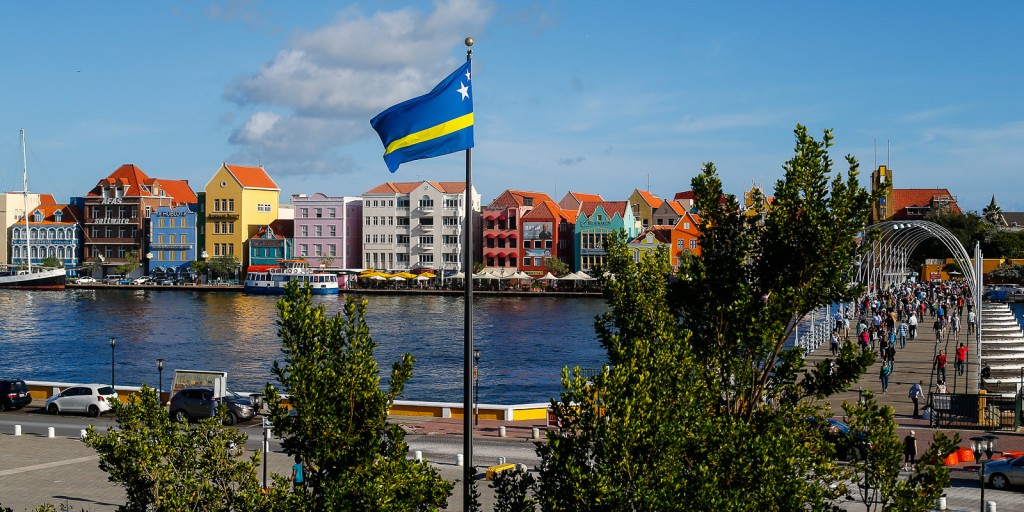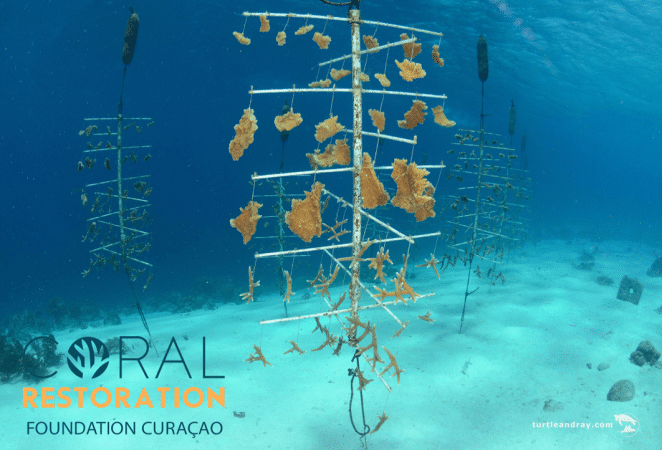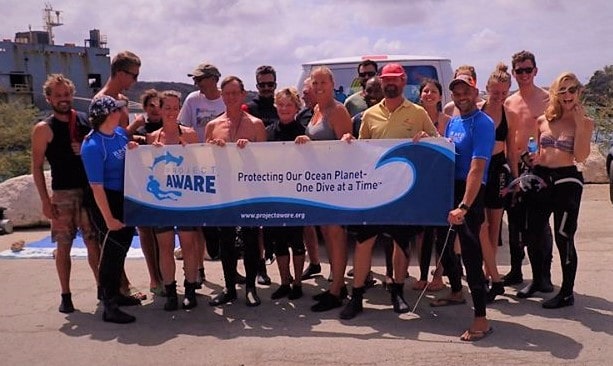Marine Life & Conservation
Sustainable & Responsible Tourism on Curaçao

Many tourists who visit Curaçao, travel here to experience the incredible beauty of the Caribbean Sea and the amazing coral reef system, that is a bevy of healthy biodiversity, only seen by scuba diving or snorkeling. But, like the world over, Curaçao’s coral reefs are facing multiple environmental threats that have been largely induced by apathy and complacency. The list of threats is seemingly endless but a few examples include water pollution, construction, marine debris, and overfishing which subsequently damages and destroys coral reefs. Therefore, there is an imminent need for sustainable and responsible tourism.
“Our ocean and dive sites are an important component of our Tourism Product. It is therefore a shared responsibility of the whole community to conserve and positively contribute to our natural resources, such as our ocean and dive sites for the benefit of our future generations.” – Miles Mercera, CHATA CEO
However, to create sustainable and responsible change, a commitment from the entire community is needed. The government, the private sector, tourists and Curaçaoan citizens alike need to come together to support great initiatives such as the Coral Restoration Foundation Curaçao and the Project AWARE “Adopt A Dive Site” Initiative led by the CHATA Dive Task Force.
Coral Restoration Foundation Curaçao
The Coral Restoration Foundation Curaçao (CRFC) officially began operations in May 2015. Initially, only starting the nursery (located on the Ocean Encounters house reef at Lions Dive & Beach Resort) with 400 coral fragments of Elkhorn (Acropora palmata) and Staghorn (Acropora cervicornis) hanging from 10 “trees”. An additional 10 trees were installed later that year that were populated with fragments of corals from the first trees. A year later, the nurseries held 1250 corals.

Since the launch in 2015, CRFC has successfully out planted over 2400 corals at various popular dive sites along Curaçao’s southeastern coastline. Additionally, the Foundation’s Board plans to “branch out” and expand the nurseries by enlisting two CRFC affiliate members which will then provide triple the number of coral fragments available to be out planted back onto the fringing reefs.
The program’s main goal is to bring back the shallow-water populations of staghorn corals in Curacao, which would not only help mitigate the possible effects of climate change but also rejuvenate reef fisheries and biodiversity, as well as help dive tourism. It’s meant to supplement the work currently being done in the region by the SECORE Foundation, another worldwide reef conservation nonprofit organization.
“The significance of the Curaçao Reef Restoration Program is that together as a community here on Curaçao, we will be restoring our shallow water reef system while educating our youth about the importance of protecting and preserving our natural ecosystem,” according to Jeremiah Peek, CRFC Board Chairperson & Managing Director at Ocean Encounters Diving, who adds: “I believe programs like this help solidify a natural sustainability for future generations.”
Project AWARE – Adopt a Dive Site Initiative
The Curaçao Hospitality & Tourism Association’s (CHATA) Dive Task Force is taking action against Marine Debris and six of its members have committed to the Project AWARE – Adopt a Dive Site™ initiative by adopting their house reefs and pledging to conduct monthly Dive Against Debris beach & dive site clean ups.
“The commitment of the Dive Task Force to the Dive Against Debris and Adopt a Dive Site Initiatives is an important step towards the creation of awareness regarding the negative effects of marine debris on the island and ultimately the conservation of our ocean.” – Miles Mercera, CHATA CEO
The Dive Bus, CURious 2 Dive, Ocean Encounters Diving, Scuba Lodge Dive Center, Atlantis Diving and Goby Divers have each adopted a dive site through the Project AWARE Adopt a Dive Site initiative, running free clean-up dives each month.
Volunteers are always needed and very welcome, so if you’re a certified diver visiting or living on Curaçao, join one of the Dive Against Debris Events to help to remove marine debris and make a difference. To date, 215 volunteer divers have removed 348 kgs / 778 lbs of debris from Curaçao’s reefs.

Mark Pinnell, Managing Director of The Dive Bus and PADI Ambassadiver says, “As divers – and even more so as Dive Industry professionals – we have a responsibility to advocate a message of sustainability and to enable our divers plus the local community to protect and respect our oceans and reefs.”
Be inspired. Become an Ocean Advocate for a Sustainable Future!
Our Oceans, Our Future, Our Responsibility.
Pictures & Video courtesy of Nature Pics, Coral Restoration Foundation Curaçao, The Dive Bus & Dive Curaçao.
Find out more at Dive Curaçao.
Marine Life & Conservation
Paul Watson Released as Denmark Blocks Japan’s Extradition Bid

Renowned anti-whaling activist Paul Watson has been released from custody in Greenland after spending five months in detention. Denmark’s Justice Ministry rejected Japan’s request for his extradition, citing insufficient guarantees that his time already served in custody would be credited against any potential sentence.
The 74-year-old Canadian-American was arrested on July 21 in Nuuk, Greenland’s capital, when his ship docked to refuel. His arrest was based on a 2012 Japanese warrant related to a 2010 encounter in Antarctic waters. Japan alleged Watson obstructed operations and caused damage to a whaling research ship during efforts to disrupt illegal whaling. Watson has consistently denied these claims, maintaining his commitment to marine conservation.
Denmark, which oversees extradition matters for Greenland, concluded that while the legal conditions for extradition were met, the lack of assurances from Japan regarding time-served credit made extradition untenable.
In a video shared by his foundation, Watson expressed gratitude and relief, saying, “After five months, it’s good to be out… and good to know they’re not sending me to Japan.” He added that the most difficult part of his time in custody was being separated from his two young sons.
Watson is a pioneering figure in marine conservation, known for founding the Captain Paul Watson Foundation in 2022 after decades of activism with the Sea Shepherd Conservation Society. His bold efforts to defend marine life have earned him widespread support, including from celebrities and conservationists. His work has also been featured in the acclaimed reality TV series Whale Wars.
Watson’s lawyer, Jonas Christoffersen, praised the decision, stating, “We are happy and relieved that Paul Watson is now free.” He added that Watson is eager to reunite with his family and continue his vital work.
The arrest occurred while Watson’s vessel, the M/Y John Paul DeJoria, was en route to the North Pacific with a team of 26 volunteers to intercept a Japanese whaling ship. His foundation described the arrest as politically motivated and emphasized that Watson’s actions were focused on ending illegal whaling practices.
Japan resumed commercial whaling in 2019 after leaving the International Whaling Commission, asserting that whale meat is a cultural tradition. Conservationists, however, continue to challenge these practices, highlighting their impact on marine ecosystems.
Despite the challenges, Watson remains steadfast in his mission to protect marine life and bring attention to whaling practices. His dedication to ocean conservation has made him a globally respected advocate for the environment.
Marine Life & Conservation
12 Days of Zero-Waste Fish-mas

This holiday period, the Marine Conservation Society, the UK’s leading ocean membership charity, invites you to make some simple changes to eating fish this Christmas to help our seas.
Dr Kenneth Bodles, Head of Fisheries and Aquaculture at the Marine Conservation Society, said, “During the festive season, our consumption increases, but so does waste. Sustainability isn’t just about where food comes from – it’s also about how you use it. By reducing waste and making the most out of your seafood, you’re not only taking steps to be more ocean-friendly, but can also help to cut costs during what is often one of the most expensive times of the year”.
The Marine Conservation Society has compiled twelve tips on how to consume seafood sustainably with zero-waste this Christmas:
Buy whole fish instead of fillets
Instead of fillets, consider buying whole fish such as salmon, hake, or lemon sole. By adopting a “nose to tail” approach with cooking, whole-baked fish not only feeds a crowd, but also helps to minimise waste and maximise sustainability by using up every part of the animal, including bones, skin, and fat.
Make fish stock
Leftover fish bones or shells can be put to good use by boiling them to make a nourishing fish stock or bisque. This can be frozen and preserved for later use and makes for a flavourful base in a soup.
Make your own fish pâté
Avoid waste by turning leftover fish, such as smoked mackerel or salmon, into a delicious pâté by blending with cream cheese and lemon. Perfect when paired with crackers.
The sustainability of salmon and mackerel varies depending on where and how it is caught or farmed. For more information on green-rated options, check the charity’s Good Fish Guide.
Buy frozen
By purchasing seafood that is frozen or vacuum-packed, this helps to reduce waste by extending the shelf life of your food.
Fish pie
If you’re wondering what to do with leftover cooked fish, why not opt for a classic fish pie with mashed potatoes, leeks, and a cheesy sauce? A sure crowd pleaser on Boxing Day.
Use the head
Don’t forget the fish head! The meat is incredibly tender and flavourful. The charity recommends a cod’s head curry or recreating Fallow’s renowned cod’s head in siracha butter.
By stretching your ingredients further, not only is this a more sustainable way to enjoy seafood, but also cost-effective by repurposing leftovers and cooking creatively.
Boxing Day brunch
Mix leftover kippers or smoked salmon with scrambled eggs for a tasty, zero-waste, Boxing Day brunch.
For best choice, make sure you buy kippers, or herring, from the North Sea and the North Irish Sea.
Zero-waste storage
A top tip from the Marine Conservation Society to avoid waste is freezing fish offcuts to save for future use.
Crisp up the skin
Even leftover fish skin can be turned into a quick savoury snack by crisping it up in an air fryer with a little olive oil and salt.
Anchovies two ways
Leftover anchovies can either be blended with butter to make a delicious anchovy butter or tossed into pasta for a hit of umami flavour.
The charity recommends opting for anchovies caught in the Bay of Biscay for best choice.
Fishcakes
For an easy, zero-waste meal, leftover seafood trimmings can be mixed with mash and fried in breadcrumbs to make fishcakes.
Pickled mussels
Try pickling mussels in 1:1 vinegar and water, with a dash of sugar for a sustainable, zero-waste snack that can be enjoyed well beyond the festive season.
Mussels farmed in the UK are a seafood superhero. Grown using low-impact methods and harvested by hand, they get all the food they need from the sea around them. This makes them one of the most sustainable, ocean-friendly, and cost-effective seafood options.
Players of People’s Postcode Lottery have raised £6.6M towards the Marine Conservation Society’s vital work in making seafood more sustainable.
Laura Chow, Head of Charities at People’s Postcode Lottery, said: “Fish is a festive favourite for many, but making sustainable choices when it comes to how we buy and eat seafood makes all the difference for our ocean. Support from players of People’s Postcode Lottery has helped the Marine Conservation Society further its sustainable seafood work, so that we can all enjoy healthier, better protected seas.”
The Marine Conservation Society encourages you to make sustainable seafood choices a year-round habit, not just for Christmas. To check how sustainable the seafood on your plate is, you can visit the charity’s Good Fish Guide. The Guide helps consumers and businesses identify the most sustainable seafood using a simple traffic light system, based on where and how species are caught or farmed. Green is the best choice, amber means improvements are needed, and red indicates fish to avoid buying.
Zero-waste gift idea
Why not embrace a zero-waste Christmas by gifting a membership to support marine conservation? It’s a meaningful, low-waste gift that helps protect our ocean for generations to come. Memberships start from as little as £5 a month – the price of a sandwich and drink from your local coffee shop.
Find the latest sustainable seafood advice for wild-caught and farmed seafood on the Good Fish Guide, downloadable to your phone from www.mcsuk.org/goodfishguide.
-

 News2 months ago
News2 months agoIconic SS United States to become the World’s Largest Artificial Reef
-

 News3 months ago
News3 months agoBook Review – 52 Assignments: Underwater Photography
-

 Gear News3 months ago
Gear News3 months agoDYNAMICNORD – New German diving brand enters the British market
-

 News3 months ago
News3 months agoExploring Cenote El Pit: A Diver’s Dream
-

 Marine Life & Conservation3 months ago
Marine Life & Conservation3 months agoBook Review: Coral Triangle Cameos
-

 Blogs3 months ago
Blogs3 months agoDive the Egyptian Red Sea this Autumn with Regaldive
-

 News3 months ago
News3 months ago2024 Ocean Art Underwater Photo Competition Announced
-

 Gear News3 months ago
Gear News3 months agoFourth Element Launches Pelagic Dive Watch



